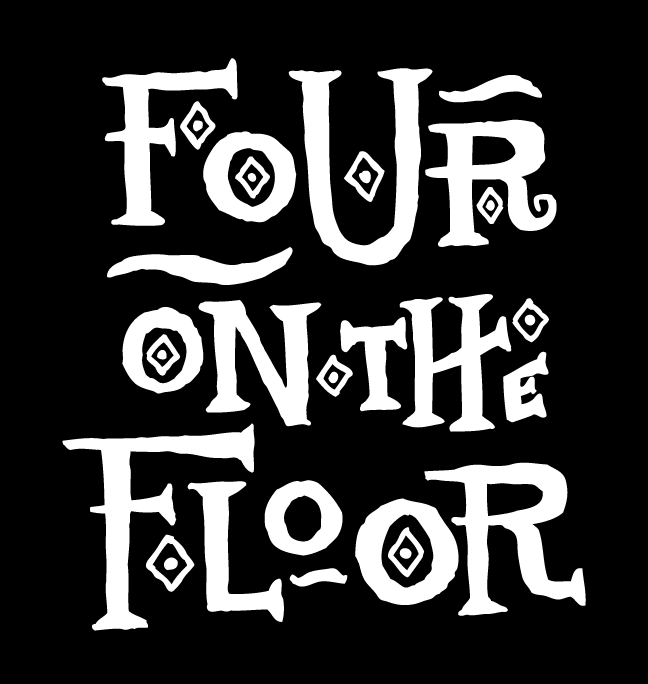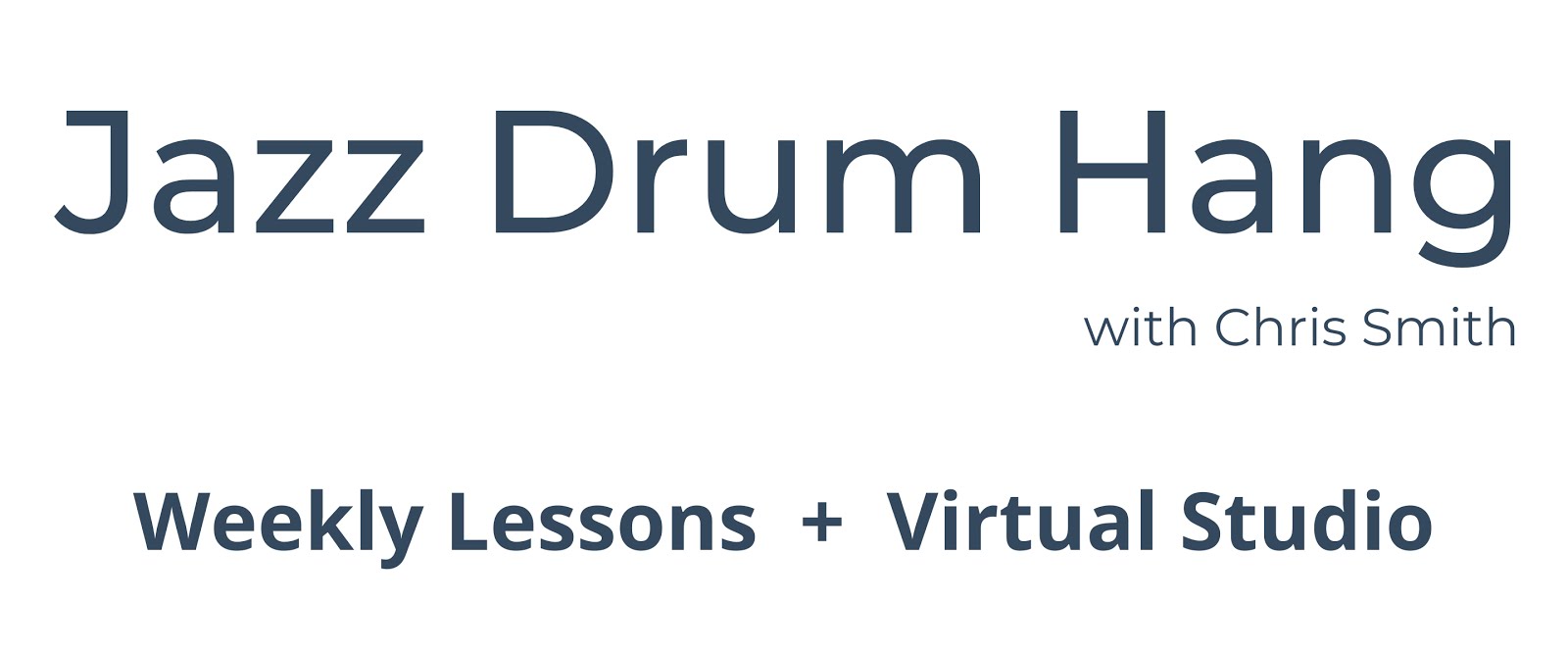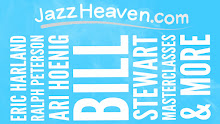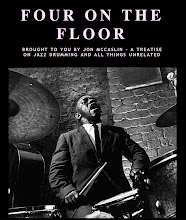
From Mark Eisenman's Facebook post, here are some very inspiring words from Toronto bassist Steve Wallace to read and think over (what a way to start my Monday!)
"Spring Is Here - Birds, Words, Melody and Song" by Steve Wallace
I heard a cardinal in high-fidelity just as I left my house the other morning - "bwordy, bwordy, bwordy" echoing down the street. The trees being still bare, it was easy to spot him by following the song - he was up in the top of a maple about forty yards away. He shifted briefly from one branch to another and the light caught him at just the right angle, a brilliant rush of crimson, even at that distance. A morning thrill, a rarity these days, trust me. I stood listening and admiring him for a few seconds and then noticed some rustling in the big tree just overhead. Two robins were flitting about, not singing much. Just as I spotted them they flew off and again the sunlight hit them and I was treated to a flash of their rusty-orange breasts. A sure sign, I thought with a smile - spring is here.
There's a song for every occasion and this took me straight to Rodgers and Hart's great "Spring Is Here" - its melody began running through my head as I walked to the subway. It struck me that this song is a kind of analogy for my aging as a musician (and hopefully my growth as one) - when I was younger, I didn't have much use for it, but it's become a favourite tune in recent years. I think the difference is that I appreciate melody a lot more than I used to, understand it better.
Bassists like myself are often slow in developing a melodic sense, because the instrument doesn't often get to play melodies - being low-pitched, it's usually much more involved with rhythmic and harmonic duties, providing the floor for other people to dance on. When you're starting out, there's so much to learn and so many things to work on that it's tempting, maybe even necessary, to take some short cuts, leave some stuff out. I largely left out melody because it didn't seem all that relevant while I was busy learning the bass, the fingering positions, scales, developing intonation, a tone and endurance. Not to mention learning how to play walking bass lines, to handle different rhythmic feels at various tempos, developing a repertoire by learning and memorizing the chord changes of songs. Then there was the mental aspect of music - the theory, ear training, harmony, modes and chord scales and on and on. Who the hell had time for melody? I was too busy being a grunt in the engine rooms of bands, a sweat-hog grinding out the quarter-notes, trying to keep the tempos up and make things swing. It's a dirty job, but somebody has to do it.
Melody was for singers or the lead instruments to take care of and besides, in jazz, the melody is only played in the first and last choruses - in between came the important part, or so I thought - the improvisation, or "blowing" as we call it. I was so caught up in sound, quarter-note groove and chord changes that I almost developed a chauvinism about melody - it was for sissies, not hard swingers, and the further I stayed away from it, the more "bass-like" and functional my playing would be. I made some progress on the bass with this approach, but it never occurred to me back then that knowing and being able to play the melody of a song would make me a better improviser, or lead to lots of other useful information and technique. I also didn't realize that learning the melody would let me remember a tune much better than memorizing its changes. When I had difficulties playing a decent solo back then I rationalized it in all kinds of ways. I was tired from laying down all those quarter-notes and by the time a bass solo came around I didn't have much left - besides, bass solos are over-rated, right? If you're going to play one though, it might as well be musical and sound good, and this is where my melodic deficiencies began to show, to cost me. My ears had spent too long rumbling around in the basements of tunes, moving from root to root. My touch was powerful but not very supple or subtle.
My taste in songs back then was governed by this non-melodic outlook too. I tended to like tunes because of their interesting or logical chord changes, or if they had a strong blues element like say, "Come Rain or Come Shine", or if their melodies tended to swing themselves, like "As Long As I Live" or "I've Got the World On A String." And of course, I loved pieces by jazz composers like Ellington, Monk, Horace Silver, John Lewis and many others because they were made for blowing and swinging. "Spring Is Here" was an example of the kind of song I didn't like back then. First of all it was originally a ballad, meant to be played slowly (yawn) and I didn't care much for ballads unless they had interesting chords and lots of them, like "Body and Soul" or "'Round Midnight." Like a lot of young guys, I wanted everything to be fast, hard, dense and raging, to have a lot of energy, just as I did.
"Spring" seemed limp and vanilla to me. The melody was kind of static both in its rhythm and notes - the first part of each half was mainly dotted half-notes and whole-notes and the second sections were just quarter notes ascending diatonically from the third up an octave to a whole-note outside the key - I completely missed the drama and crescendo of this. The song had awkward chord changes too - its melody was so Plain-Jane that I couldn't hear any interesting ways to harmonize it. The opening phrase starts on the major seventh, goes up briefly to the tonic and resolves back down to the sixth, and this repeats. Big deal, I thought, what are you supposed to do with that? Where's the swing, the action here? I was too green to realize the diminished harmony implications of this type of melody and I seemed to have missed the class where they taught the diminished scale, one of the only really useful ones. I just couldn't get anything out of the tune at all, grimaced whenever it was called.
My opinion of "Spring" began to change after I heard Bill Evans play it on his great "Portrait In Jazz" record - hearing a genius play a song will tend to sell you on it. Bill's version is in Ab, slow and lyrical as you'd expect but it's also really intense, there's lots of heat there. As always, he gets the piano to really sing the melody and found great chords for the song. He uses an E7 in the first bar, so the melody note G is the sharp nine of that chord, then resolves to an Ab chord with an F on top and Eb in the bass. This melody phrase repeats, but he keeps the chords moving downward with a Dmin7b5 and a Db7, avoiding monotony. When I first heard this, I thought my head was going to explode, it was just so brilliant. He also harmonizes every one of the ascending quarter-notes beautifully, breaking up the seeming static quality of the tune. Evans brings a lot of motion to the song even at this tempo and on a basic level that's what music is - tones moving in rhythm. I began to realize here that chord changes are defined and dictated by the melody note on top, that seemingly plain melody notes can lead to interesting chord possibilities and that none of this happens unless you pay attention to a song's melody. Really, the melody tells you what the chords mean, otherwise they're just clumps of notes.
Later, I heard recordings of "Spring" by singers like Ella Fitgerald and Sarah Vaughan and came to like it more from also hearing the words. They're by Lorenz Hart, who I think is in a class of his own as a lyricist. He was an unhappy, nasty, screwed-up guy but very gifted with rhyme, rhythm and wit, a poet really. I also played the song with a singer named Anne-Marie Moss, who was truly an awful bitch but could really sing slow ballads and this helped me appreciate the delicate, special mood of this song. The clincher for me though was recording it with singer John Alcorn on an album of all Rodgers and Hart songs about ten years ago. John sang it in the same key as Evans and used his chords, but did the song as a slow bossa nova, which really suits it. This type of tempo played with lots of space can be mesmerizing and when we finished the take I was soaked with sweat, barely aware of time or place. I thought to myself, "Jesus, Wallace, how could you have been such a dope? What a great song this is." Really, it's a singer's song, but many of the great ones are. The trick when playing it instrumentally is to maintain that vocal quality, as Evans did. Here are the words:
Spring is here.
Why doesn't my heart go dancing?
Spring is here.
Why isn't the waltz more entrancing?
No desire, no ambition leads me.
Maybe it's because nobody needs me.
Spring is here.
Why doesn't the breeze delight me?
Stars appear
.Why doesn't the night invite me?
Maybe it's because nobody loves me.
Spring is here, I hear.
Hart wrote some lyrics better than this, but not many, and not by much - they're just deadly and fit the melody beautifully. Beyond knowing the melody, Lester Young always insisted musicians should know the lyrics of the songs they play, even though they wouldn't be sung. He said knowing the words leads you to play the song at the right tempo, phrase it properly and breathe in the right places. Some find this ethereal but I think he's dead right - too often I've heard musicians wreck songs by playing them at the wrong tempo (usually too fast) and it's because they don't consider the words. Above all, knowing the words tells you what the song means, what it's about, which affects your approach to it, or should. At its best, playing a song is like telling a story, and it at least helps to know what the story is before you start talking or blowing your horn.
After playing the bass for several years I finally got more in touch with melody after seeking the advice of a great local musician, Don Thompson. Don does many things really well, I just hate him - plays great piano, vibes, bass, composes and arranges, you name it. In the late '70s he was playing a lot of bass and I heard him often. His left hand amazed me - his solos were really melodic and eloquent, he seemed to range all over the bass effortlessly with great articulation and pitch, it was scary. I finally worked up the nerve to ask him how he'd developed his left hand and he answered in his typically deadpan, slightly bland manner - "I practiced the melodies of songs in all twelve keys, really slowly, making sure I got the notes right."
This gobsmacked me, I was stunned - melodies in all twelve keys?!? The advice had come from God himself though, so I started working on it, with simple tunes like "Georgia" and "Bye Bye Blackbird" at first. It was slow going, hard work and mentally tiring, but it beat the hell out of scales and Simandl exercises and gradually I found that practicing this way improved all facets of my playing. I became freer ranging around the bass without thinking about the finger positions, letting my ear guide me, and different keys became less foreign and scary. My articulation and pitch improved, my ears opened up and I started to hear more, get more flow and ideas in soloing. Above all, I was learning about phrasing melodies, how they have contours and shapes. It began to occur to me that a song's melody is like its DNA, contains a code of interval patterns and relationships that define it and these can be used in improvising, in hearing counter-melodies, guide tones and even in finding better bass notes in accompaniment. I was beginning to almost feel like a housebroken musician, I only went all over the carpet occasionally now. Despite this foray into the lofty, romantic, ozone layer of melody though, girls continued to give me a pretty wide berth. I guess the glamour of the jazz life was just too much for them - yeah, that must have been it.
Ironically, areas like rhythm and harmony that seemed to have nothing to do with melody also improved. My walking bass lines and time feel sounded better because the articulation, pitch and note choices were better and my understanding of harmony became sharper because I was more aware and heard better. I started to relax a little when playing, rather than trying to hammer everybody over the head with fat quarter notes all the time. Much as people mistakenly think of the mind and body as being separate, I'd thought of melody as being distinct from rhythm and harmony, but really they're all intimately connected and melody leads straight to the other two and vice versa. Don Thompson's bass playing and mine are about as dissimilar as you could imagine, so it's also ironic that the best piece of musical advice I've ever received should have come from him, and I can't thank him enough.
Drums can't really play notes, but melody has a rhythmic component and good jazz drumming is informed by melody too, believe it or not. The really good drummers I've played a lot with - Terry Clarke, John Sumner, Barry Elmes, Ted Warren - all have a strong sense of melody and form, listen well and know how the tunes go, adjusting their phrasing, sounds and textures according to the melody, its shapes and dynamics. Jerry Fuller played pretty good bass and was an excellent scat singer. He often saved my butt if I wasn't sure of a tune - he'd hum the right bass notes to me while playing the drums. He was a great musician and a prince - God, how I miss him. Jake Hanna used to travel with a miniature xylophone and have the melodies to lots of songs written out - he'd practice playing them every day. This kept his ears sharp, he called it "taking his melody vitamins." He used to say the melody chorus is also a jazz chorus and unless someone plays a stupendous solo, it's often the best chorus. Andrew Miller is a friend of my son Lee, a good young drummer and we played some together as a trio before he moved back to B.C. He kept a small pad and pencil and after certain tunes he'd lean over and ask me the name of the song, then he'd write it down. I asked him about this and he said if he didn't know a tune, he wanted the title so he could find a recording of it and listen - he said he played the tune better if he knew how it went. That's it in a nutshell - even if you don't play the melody, you'll play better if you know it. From the mouths of babes.
I'll always be attracted to the more extroverted and greasy aspects of jazz, that's just hard-wired into me. But now, playing lyrical tunes with beautiful melodies is also right up there among my favourite things to do. One of the nicest compliments I've ever received was from saxophonist Mike Murley a few years ago after he'd heard me play a set or two with somebody at the Montreal Bistro. "Wanker" he said, "you really know how to play songs." It made me proud to hear this, because playing songs is important to me, I think of them as the basic unit of musical civilization, the same way having people over for dinner is the basic unit of social civilization. I try to impress this on younger music students whenever I'm talking with them - by all means, work on all the technical and theoretical stuff they're shoving at you in school, but don't lose sight of the big picture, keep your eye on the prize. The prize is playing songs - at the end of the day all your skills and everything you've learned should boil down to being able to stand up in front of people, play a song and make it your own, take it somewhere, have it sing, move people, excite them, hold their attention. If you can't do that, then what is the point of playing music at all?
When I go out to play or hear jazz, I want to hear musicians listening to one another, playing together. I'm not interested in any particular style, but I want to hear some lyricism, some space, some intensity, some feeling of the blues and swing. By these last two, I don't mean I literally want the music to sound like Big Joe Turner or Benny Goodman, although that wouldn't be the worst thing. I mean I want the music to have some dirt and cry in it, to show its ass a little bit, have a dancing quality and get off the ground. There should be lots of sweat and laughter - music is hard work and serious business, but it has to be fun too - after all, you don't work music, you play music. Above all, I want to hear some songs, or at least some music that has the quality of song in it. I don't want to hear what musicians know, I want to hear them translate what they know into what they feel - feeling is all that music is, really. You can't see it or touch it, you can only hear it and feel it.
I also don't want to hear mere cleverness or virtuosity, music that's all just about harmony or rhythmic algebra. Guys trying to outplay each other, not listening or leaving any room, running a bunch of notes together in an endless dirge of tuneless, limp drivel. Take this show-off, "jazz from the neck up" back to whatever school you learned it in, boys. This may sound old and cranky, and maybe it is - I'm gettin' there. Most of what I'm trying to say is nicely illustrated in a story about the great, unique pianist Jimmy Rowles, who knew as much about songs and harmony as anybody who ever lived. He was playing a piano-bass duet gig for a while and one night his regular bassist sent in a sub, who decided to try and impress the master with his knowledge of harmony by hitting him with a whole slew of super-hip bass notes and chord substitutions, playing everything but the kitchen sink. After a couple of tunes worth of this, and working on his second double vodka, Rowles turned to this Einstein of the bass with a glare and rasped "I'm aware of the possibilities.......let's just play the f---ing song the way it goes and make some music, OK?"
Betty Carter pushed the boundaries of jazz singing by trying to make the voice a fully-fledged improvising instrument like the others. This led her to more and more abstraction, making sounds with her voice that weren't conventional for singers, using a huge range, and often eschewing the melody. It was daring and difficult, a challenge for her, her musicians and audience. Some liked her singing, others shrugged and asked "Aren't singers supposed to sing the melody?" She was feisty, to put it mildly, and answered this by naming one of her records "It's Not About the Melody." While I have a lot of admiration for her and any other artist who hoes a hard, lonely road by going their own way, I have to respectfully disagree - it's always about the melody, that's where the music lives. Hear it and it will set you free, like a bird.
-Steve Wallace
Toronto Bassist
(via Mark Eisenman) 2012


















No comments:
Post a Comment